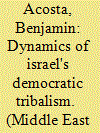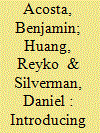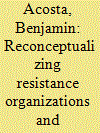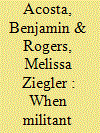|
|
|
Sort Order |
|
|
|
Items / Page
|
|
|
|
|
|
|
| Srl | Item |
| 1 |
ID:
144083


|
|
|
|
|
| Summary/Abstract |
Suicide attacks continue to plague a multitude of conflict zones. However, the scholarly literature on the phenomenon has yet to produce a theory that explains why militant organizations at different stages of development, facing dissimilar enemies, and situated in unique conflict environments adopt suicide attacks. Moreover, the suicide-attack phenomenon now presents an intriguing puzzle. While most militant organizations fail to achieve their core political ends or ‘outcome goals’, organizations that employ suicide attacks are even less likely to succeed. Still, organizations have adopted suicide attacks at increasing rates. Given their ineffectiveness in precipitating outcome-goal success, why do organizations continue to adopt suicide attacks? Like all organizations, militant organizations share two common aims: (1) to survive and (2) to achieve outcome goals. As martyrdom operations often fulfill the ideological or cultural expectations of certain identity groups, representative organizations may adopt suicide attacks to expand constituent support or enhance status within a particular political landscape. Further, organizations can conduct suicide attacks to signal ideological solidarity with fellow militant organizations. This article analyzes an original large-N dataset of militant organizations alongside an original database of over 5,000 suicide attacks, and evaluates numerous case examples. The results demonstrate that militant organizations across regions and over time have adopted suicide attacks in order to gain supporters, promote organizational longevity, and boost or preserve status.
|
|
|
|
|
|
|
|
|
|
|
|
|
|
|
|
| 2 |
ID:
129898


|
|
|
|
|
| Publication |
2014.
|
| Summary/Abstract |
This article evaluates Israeli national identity and its core founding tenets of Zionism, democracy, and Judaism. For decades, demographic changes and associated cultural and ideological fluctuations have gradually pushed Israel into a national identity conflict, as multiple ethnic and sectarian identity groups have come to promote competing interpretations of the state's purpose, political nature, and connection to territory. Continued demographic shifts, situated amid the sociopolitical dynamics of what this article will define as Israel's "democratic tribalism," will further test the compatibility of the constituent parts of Israeli national identity: the respective roles of Zionist ideology, democratic institutions, and the territory of the historic Jewish homeland.
|
|
|
|
|
|
|
|
|
|
|
|
|
|
|
|
| 3 |
ID:
188034


|
|
|
|
|
| Summary/Abstract |
In seeking to overthrow, reform, or separate from an existing political system, both violent and nonviolent resistance organizations emerge. A common finding shows that democracies face violent resistance more so than autocracies. Studied less remains the pattern of organizations using nonviolence in efforts to topple autocratic regimes. What explains these trends in conjunction with one another? I put forth a theory contending that exclusionary politics frames the organizational use of violence and nonviolence in resistance campaigns. To test hypotheses, I analyze an original dataset of over 500 resistance organizations (1940–2014). I complement the large-n tests by reviewing resistance organizations that formed amid Lebanon’s Civil War (1975–1990) and Cedar Revolution (2005) using field methods, qualitative contextualization, and process tracing. The results reveal that the relationship between the target political system and the degree of inclusion of a resistance organization’s constituent identity group helps explain the adoption of violent strategies.
|
|
|
|
|
|
|
|
|
|
|
|
|
|
|
|
| 4 |
ID:
120429


|
|
|
|
|
| Publication |
2013.
|
| Summary/Abstract |
This article examines the contemporary phenomenon of suicide attacks by fusing network analysis and time-series econometrics. We find that a global network of militant organizations drives the reproduction of the suicide-attack phenomenon, and brokers within the network mark the primary perpetrators and diffusers of the tactic. The introduction of a fourth level of analysis of political violence demonstrates that network connections between organizations form a system that perpetuates suicide attacks. An organization-level analysis reveals that ideological congruence facilitates the establishment of network connections. As exemplified by the wide range of employers and targets, and moreover by the generation of an autogamous function, contemporary suicide attacks represent a unique sociopolitical phenomenon. Accordingly, organizations that use the tactic warrant a distinct classification.
|
|
|
|
|
|
|
|
|
|
|
|
|
|
|
|
| 5 |
ID:
190845


|
|
|
|
|
| Summary/Abstract |
Existing literature on civil wars relies predominantly on state- and organization-level variables to understand conflict dynamics and outcomes. In this article, we propose that rebel leaders’ personal backgrounds and experiences are also key to explaining the behavior of the organizations they lead. Just as scholars have long highlighted the importance of state leaders’ biographical characteristics in interstate war and diplomacy, we argue that the attributes of rebel leaders affect their organizations’ decisions and actions in civil war. To substantiate our claims, we introduce the Rebel Organization Leaders (ROLE) database, which contains a wide range of biographical information on all top rebel leaders in civil wars ongoing between 1980 and 2011. We first describe the contents of the database and present a number of novel descriptive findings about rebel leaders. To illustrate its utility, we then examine the influence of rebel leaders’ attributes on their organizations’ use of terrorism in civil war. Ultimately, our work encourages – and enables – a new research agenda that goes beyond rebel organizations and campaigns as units of analysis and brings individual leaders more fully into modern conflict and peace studies.
|
|
|
|
|
|
|
|
|
|
|
|
|
|
|
|
| 6 |
ID:
132214


|
|
|
|
|
| Publication |
2014.
|
| Summary/Abstract |
Militant organizations pursue two common aims: to survive and to achieve the goals that define their raison d'être. Yet, elements that sustain the life spans of militant organizations are not necessarily the same components that advance the accomplishment of their core, or "outcome," goals. Further, some organizational practices, such as the use of suicide attacks, generate a tradeoff that bolsters survivability while detracting from the effective pursuit of outcome goals. This study demonstrates that three operating conditions explain variation in the duration and achievement of contemporary militant organizations: receptiveness to tradeoffs, levels of external support, and the nature of adversaries. As such, the unique effects of different operating conditions reveal why many militant organizations survive for long periods of time but only a few achieve the goals that justify their existence.
|
|
|
|
|
|
|
|
|
|
|
|
|
|
|
|
| 7 |
ID:
167293


|
|
|
|
|
| Summary/Abstract |
In recent years, scholars of various forms of conflict involving revolutionary and militant organizations (such as terrorism, civil war, and nonviolent contestation) recognized that arbitrary organizational categories and typologies often leave large-N studies incomplete and biased. In moving away from nominal categorical boundaries that produce such selection biases and looking to a more generalized conception of resistance organizations, I constructed an original dataset that aims to bridge the gap between conflict literatures. Transcending traditional classifications, the Revolutionary and Militant Organizations dataset (REVMOD) consists of over 500 resistance organizations operative sometime between the years 1940 and 2014 and includes a diverse array of types of resistance organizations – many of which utilize a multitude of tactics, operate in various conflict contexts, and/or confront numerous target types. The dataset documents organizational attributes, allies, and adversaries at annual intervals (organization-years), making reliable time-series analyses possible. Tracking variables like organizational outcome-goal type and degree of achievement, political capacity, leader/s, constituent identity group, violence and demonstration levels, size, organization aliases, and several others, REVMOD breaks new ground in the collection of information on resistance organizations and can spur countless studies. A preliminary data analysis demonstrates that differences in organizational political capacity explain variation in resistance outcomes generally and in particular contexts such as civil war, terrorism, and nonviolent revolutions. REVMOD provides a unique opportunity to develop a new research paradigm for resistance studies that employs large-N empirical analyses to uncover generalities between different forms of political contention in the contemporary era, as well as to better understand why and how distinct resistance processes may produce specific outcomes.
|
|
|
|
|
|
|
|
|
|
|
|
|
|
|
|
| 8 |
ID:
174711


|
|
|
|
|
| Summary/Abstract |
The literature on political violence emphasizes two main ways that militant organizations ‘win’: eliminating the adversary outright or coercing the adversary into making concessions. While most do not win in this way, some organizations that fail to win go on to achieve their goals in post-conflict political competition. What explains variation in the post-conflict political success of militant organizations that did not achieve their organizational goals on the battlefield? In this study, we run the first large-n empirical analysis of the phenomenon. Our empirical results show that organizational size and wartime lethal capacity positively predict the political success of militant organizations that did not win on the battlefield. Other plausibly related features of militant organizations, such as their united wartime front or coherent ideology, do not predict eventual political success. Additionally, we investigate the case of Frente Farabundo Martí para la Liberación Nacional in El Salvador and present marginal effects analyses—further illustrating the effects of a legacy of violence and organizational size on post-conflict political success.
|
|
|
|
|
|
|
|
|
|
|
|
|
|
|
|
|
|
|
|
|